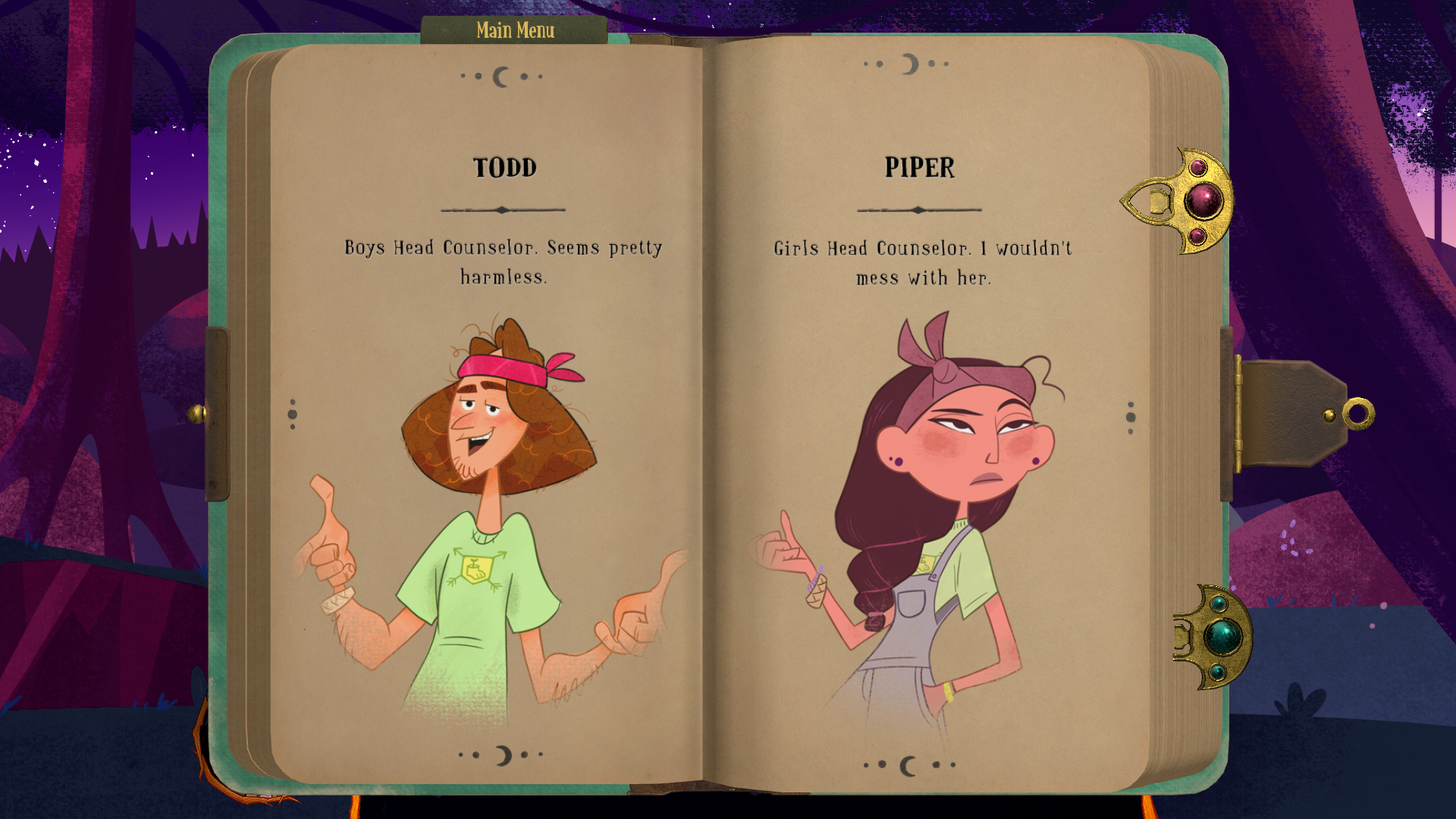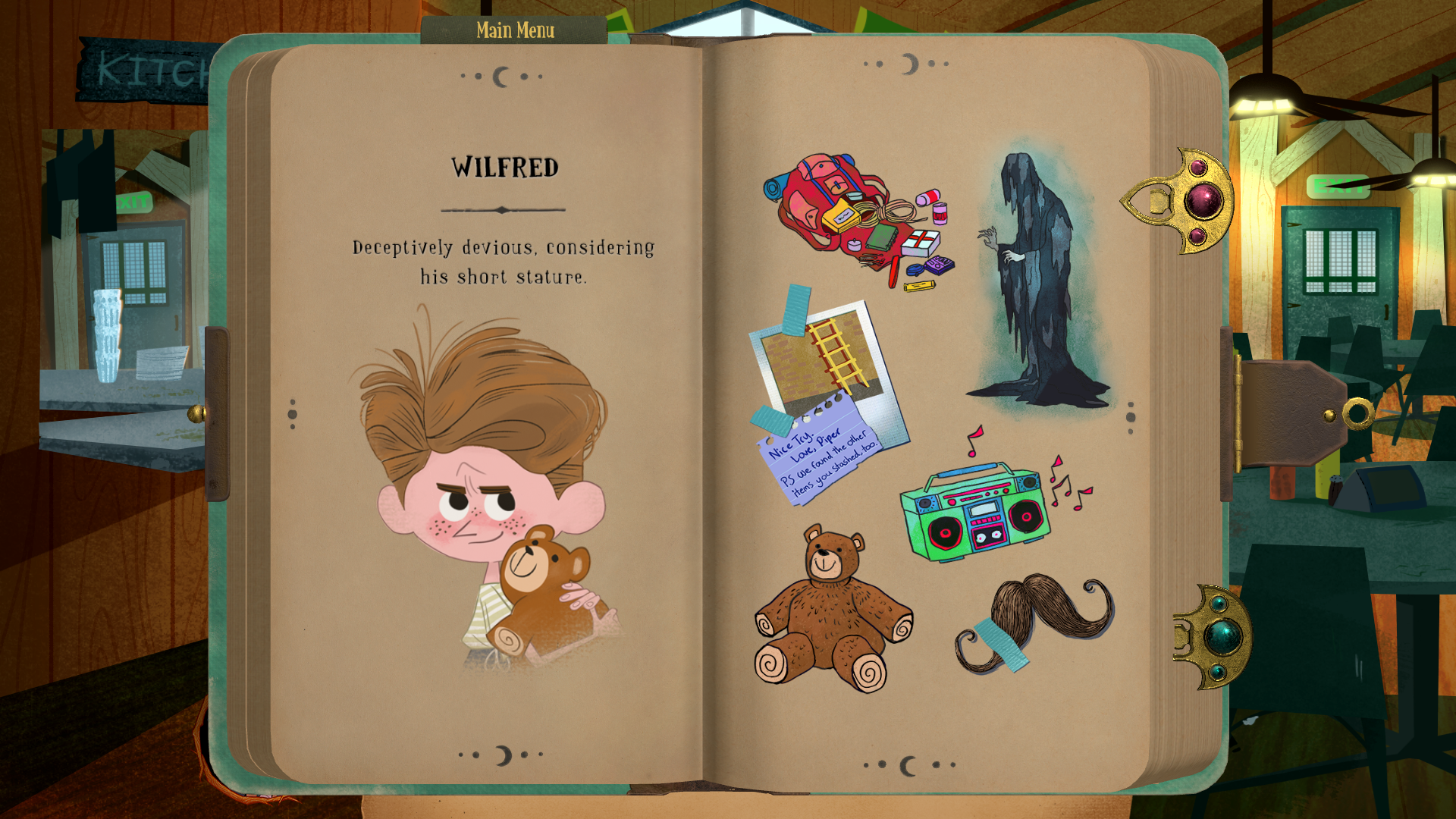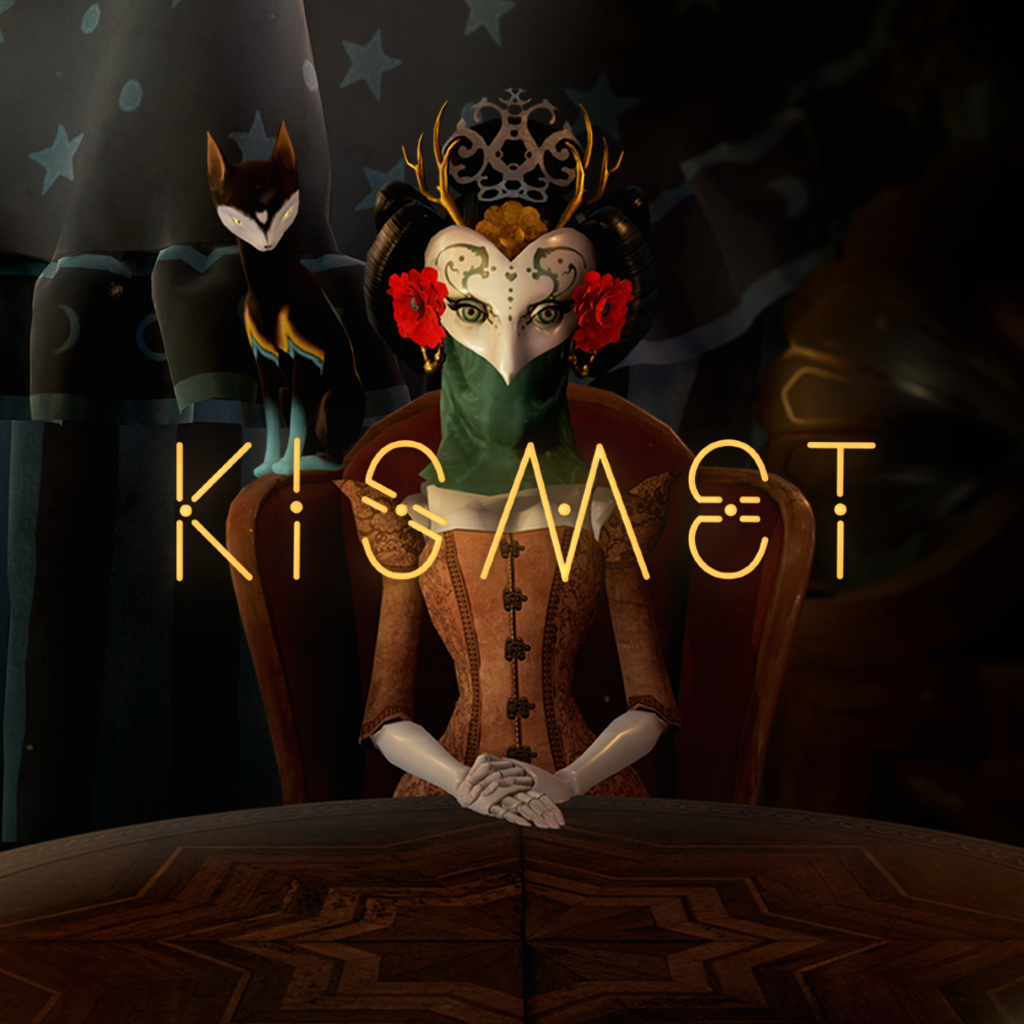Imagine that you’re a witch, living in a world of witches. Now imagine that you somehow leave the world of witches and end up in the human realm. Now imagine that you’re at human summer camp, and somehow, feel more at home than you ever have.
That’s the situation that Alexei Bochenek, writer and narrative designer of Camp W, and the rest of the team at Psyop Games placed players in in their recent visual novel. It’s a charming game, with wonderful art, funny dialogue and more intriguing characters than you can get to know in one playthrough.
We recently caught up with Bochenek, and talked about Camp W‘s origins as an animated TV show, the menagerie of interesting projects in the works at Psyop, and the decision to include a real-life witch alongside the game’s cartoon-y sorcerers.
From TV to PC
Cliqist: So, Alexei, in this game you play a witch heading off to summer camp and making friends. It seems inevitable that people would compare the game to Harry Potter (like I did here). Were J.K. Rowling’s books an inspiration as you were developing Camp W? What other witch-related fiction did you draw from?
Alexei Bochenek: A bit about the development of the idea for Camp W versus the actual game itself: At first, Camp W was called “Camp Whupiwitchi,” and was developed to be a TV series. The idea went a long way down that road— with character designs and sample episode outlines, and all of the other stuff that goes into pitching a full-fledged animated series— but never found the right home and was put on the back burner. The creative lead throughout that process was Kelly Shay, who eventually became creative director of Camp W the game. I know that Kelly is a Harry Potter reader, but the main inspiration for the story was much simpler: moving around a lot as a kid. While the lead character is a Witch in the world of Humans, it’s much more informed by Kelly’s real life experiences of repeatedly being a new kid in a world of established friendships than by any singular work of fiction.

So, then I discovered this world that Kelly and the team at Psyop had created and I said “it sucks that this didn’t become a show, but we could still make it a game!” I became the narrative designer and writer of Camp W the game, and started re-working the story a bit, injecting my own experiences as a kid who went to years of sleepaway camp, and opened it up and expanded it for this branching narrative experience. I’ve never actually read Harry Potter, but I’ll happily share my primary inspiration: Naruto. To me, Naruto is one of the greatest fictional worlds of the modern entertainment era. Naruto already lined up really well with Kelly’s work on “Camp Whupiwitchi,” so I looked at ways that Naruto grew and stretched over the years and incorporated some of those ideas into my narrative design and writing for Camp W.
On the Outside
Let me give you just a few examples… For starters, Naruto is the story of a powerful outsider who is isolated by their power rather than elevated by it. What good is it to be the most powerful person if you have no one in your life who cares about you enough to warrant using that power on their behalf? Take that further, and you realize that once that bond forms–that “I would move mountains for you” bond–you realize that true friends don’t actually want or need you to move mountains for them, they just want to be treated with mutual love and respect. Second, in Naruto, each character is very much the star of their own parallel story, the next in line for a unique family that stretches far back into history.
I wanted each character in Camp W to feel that way, their actions and personalities informed by their own stories that you, an outsider, are allowed to peek in on. This also related to the broader mythology of the world of Camp W, in which certain characters are edging towards this huge discovery–the separation of the Realms of Humans and Witches–before you even get there. Finally, there is the onion-y layered goodness of the story in Naruto, which is a product of this ultra long form storytelling technique that is a requirement for serialized comic book stories.
Nowadays in pop culture we call it the “expanded universe,” but it’s essentially the idea that behind every door is an incredible story, and even if you don’t surface all of those stories right away, letting their existence inform the stories you do tell adds a richness of detail that enhances immersion.

Camp W is for Weirdos
Building on that, stories like Harry Potter put the reader in the shoes of a seemingly average person who discovers that they’re actually not so average. What was your inspiration to do the inverse: casting players as a witch who is trying to fit in with humans?
The “W” in Camp W, as you know from playing the game, stands for Whupiwitchi, the official name of the camp that you attend when you play. It also not-so-slyly signals W for Witchcraft. But to me, the real meaning of the W is Weirdo. You’re not a Witch fitting in with Humans, you’re a Weirdo finding exactly your own people—and that would apply to this game no matter if you played as Sid, Sophie, Ruby, etc. Back home, during the school year, that’s the time you’re not fitting in. At camp, you belong.
Real-Life Witchcraft

Sophie is a really interesting character. Where did the idea to include a real-life practitioner of witchcraft as a friend for Lil/Ly?
As I mentioned before, I haven’t read Harry Potter, so when I came on board to write, I didn’t have a bunch of pre-defined “witchy” concepts to recycle—nor did I want to write that kind of derivative story. So, the first thing I did was a lot of reading about actual Pagan Witchcraft and contemporary Wiccan culture. I was looking for inspiration, but also hoping to reach a level of understanding where I could avoid lazy appropriation or casual disrespect of a culture made up of real people.
As a writer, research is very important to me, and throughout that research I found a lot to admire about the beliefs of Wicca. I found myself so taken, that I just said hey… why not? Why not introduce a character into a story about these contemporary “cartoon” Witches who is, herself, an actual Pagan Witch? I’m sure it has been done somewhere—what hasn’t, right?—but there were no other examples that sprang to mind, so I decided to explore the contrast of fantasy and reality very directly by giving Sophie Wiccan beliefs. In earlier drafts, it was much more overt, with very specific references to Pagan and Wiccan rituals and concepts, but as a team we decided to dial it back a bit. The interplay of actual Pagan Witchcraft and Witch-related pop-culture fandom is a meaty topic that could fill up volumes on its own, but ultimately is not the point of making Camp W.
In the end, my hope is that actual practitioners of Wicca who play this game will feel like their beliefs are placed on equal footing with any similar religious beliefs, respected by my characterization without being exploited for cheap jokes.
One Piece of a Universe
Was Camp W originally scoped to be a longer game? I noted in my review that it feels like its gearing up for a full summer of fun and then stops short. Were there time/budget constraints that kept the project small?
The truth is actually the exact opposite. It was scoped to be a much smaller game, but I couldn’t help but keep stuffing more and more ideas and scenes into it. To some extent, this is done with a bit of mischief in mind, a meta-textual reference to the expanded universe-iness of everything these days, Camp W included. It’s never enough to tell one story, you need to set up six sequels! However, I do take the criticism seriously, that the story is a bit top-heavy and picks up a little too much speed as it gets rolling. My hope is that the modest price of the game combined with the replayability of the branching narrative structure leaves people wanting more but not terribly disappointed. There are story connections to be made within the various branches that can’t be seen in one playthrough, and a full secondary character’s bonus story hidden behind choices. For the price of a movie ticket, I think it’s a fair amount of content.
It definitely feels like this world could be the setting for additional stories (involving Lil/Ly and otherwise). Is Psyop considering a sequel?
Right now there’s only a Camp W the game but it was always meant to be an evolving world. We aren’t simply considering a sequel, but are considering Camp W as a long-term studio project that will continue to grow as time goes on. As far as Camp W the game is concerned, we’re preparing to release it on tablets and phones in the near future, and considering other platforms after that. As with any game, sales and reviews will factor into what projects happen when. Personally, I’d love to see this become episodic.
Psyop’s Games
Psyop seems like a really interesting company. Can you tell me a little bit about your team’s role there?
Psyop is a very, very interesting company! Our core focus is that of a film production company who specialize in design and animation, producing commercials, branded content, and experiential installations for some of the most famous brands in the world from Coca-Cola to Apple to Clash of Clans. You can see hundreds of examples of our work on our website, and because Psyop is very good at what we do and have been kicking ass since 2001, you’ve almost certainly seen our work either on TV or the web. But that’s not all we do, as you know from playing Camp W. To make these envelope-pushing commercials, that means maintaining an incredible team of artists, technicians, and creatives, and constantly pushing our skills to the limit. It also means finding creative outlets for our team beyond the jobs we are hired to do. So, along those lines, we have an ongoing effort called Psyop Originals to foster original ideas that come from members of our staff, as well as a separate effort called The Lab which includes staffers who are dedicated full time to technical and creative innovation, including VR, AR, game engines, and so forth. It’s the combination of those efforts that yielded the idea for Camp W as well as the custom branching story authoring software we invented and used to write it, called Branching Storywriter.

A Dash of Kismet
Were you involved with the development of Psyop’s first game, Kismet? If so, what lessons did you learn on that project that helped in the development of Camp W?
I ran (and continue to run) the marketing and publishing of Kismet, and many members of our team worked on both projects. I actually had the good fortune of travelling the world with Kismet, a VR experience I absolutely adore, speaking about the experience and demoing it for guests at shows like E3 and IndieCade in LA, PAX in Boston, and even the D&AD awards symposium, which is a creative forum in London focused around advertising. The creative director of Kismet, David Chontos, is also a close friend and supernaturally talented creative who supported our Camp W team in spirit and in practice and helped me out a lot in executing our final vision. It’s hard to compare the two projects directly, as they are so different, Kismet being a technical achievement and a VR experience, and Camp W focusing on story first and launching into a much more mainstream part of the marketplace.
However, there were some broad lessons that I learned, as a person. I put VR headsets onto hundreds if not thousands of heads over the run of Kismet‘s first couple years, which meant a lot of face-time with a lot of people. Standing on the show floor at PAX and talking about your game non-stop for days at a time is a humbling experience. It allowed me to put face, after face, after face… to an audience that might otherwise be abstractly defined as numbers in a spreadsheet or points on a graph. It provided me with the surreal experience of standing in the looming shadow of the next big shoot-someone-in-the-face game while speaking passionately about something much different—something thoughtful, and strange, and beautiful. That experience helped me put certain things into perspective for myself, to ask and answer difficult questions about the boundaries of what I’m comfortable making and marketing, and I am eternally grateful for that.
It also showed me the incredibly long tail of a modern digital product. Kismet has been out for over two years, and yet every day that goes by somebody new tries it for the first time. They are still writing reviews, and emailing us questions. That’s a very curious thing, the forever-ness of digital media. It’s quite intimidating, but it’s also comforting. There’s a lot of pressure when you think about your game living forever, but there’s also some comfort in knowing that there will be time for people to discover it down the road.
Here and Now
It’s only been a few months since Camp W’s release, and we’re very excited to see how the visual novel’s universe evolves down the road. In an overcrowded indie market, games can always use a spark of magic.



